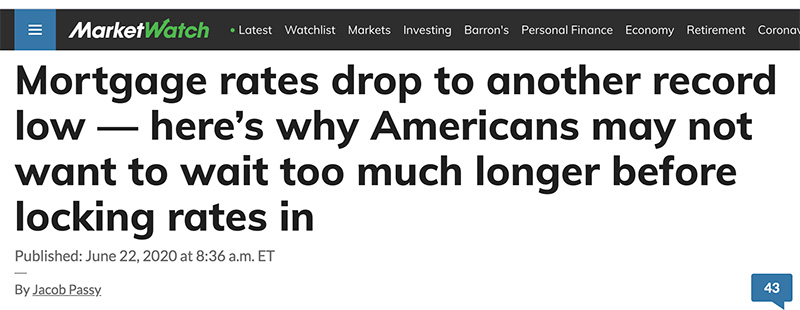Nearly all of the inquiries I receive for refinancing start off the same way: “I heard that rates are at record lows and I wanted to refinance my home.” Often times the conversation veers off into confusion for the customer making the inquiry because of my line of questioning. Most people are tuned into the news and the internet and when they hear rates are at all-time lows or see an ad featuring a low rate, they get “rate happy” and must have it.

Making Financial Sense When Refinancing
The confusion comes in when they realize I am not quickly closing them and proceeding to the loan application. Our culture has us focused on closing, winning, and speed. It is my job to apply the brakes and tell my customers that the refinance should make financial sense for them. We need to review their situation and what they are after, think about how long they plan to keep their home, and see how it fits into their financial strategy.
I always start the review with a copy of their current mortgage statement where I can see the payment breakdown and help assess if refinancing will benefit them. My customers often are not able to accurately recall the finer details of their mortgage payment, such as mortgage insurance and homeowners’ insurance, so I request the statement.
Financial Analysis Brings More Questions
Once I have all the accurate data we do an analysis and answer more questions like, “Do you want to roll in closing costs to the new mortgage?” and “How do you want to re-establish your escrow account (financing or paying cash)?” I also explain how loan payoffs work so they can manage their short-term cash flow as well. From there, we can look at the cost of obtaining a new loan. Are they paying points to get a lower rate? Are there any adjustments we need to factor into the rate/fees for property type or credit score or consolidating a current equity line?
Now we can see if the new lower payment will offset the cost of the refinance within the time period my customers plan to keep their home. If they are thinking of selling in two years, the numbers may not work out so well. This is a factor to be considered before grabbing that bright and shiny low interest rate dangling in front of you.
If Refinancing, Don’t Get Greedy and Stay Alert
Another thought to keep in mind is don’t get greedy. If you find that refinancing is a good move for you, then do it and ignore all the noise about where rates are heading. The news outlets are often wrong and behind, and the market can change rapidly. No one knows with any certainty the top or the bottom of any asset price and interest rates are no different. If you find someone who claims to know, it is a sign that you should be concerned. Another sign is a mortgage lender wanting to quickly close you on applying for a mortgage without taking the time to help you assess your situation and make a decision in stages.
Ultimately, you will determine whether or not a refinance is a good move for your financial situation. Wouldn’t you rather have someone alert you to all this rather than find out all on your own down the road?

